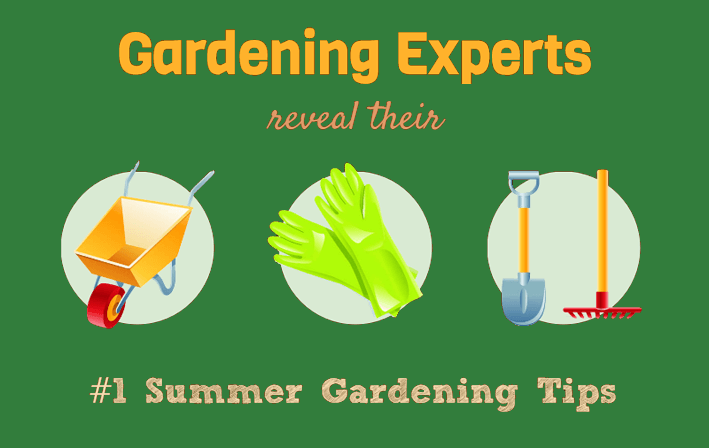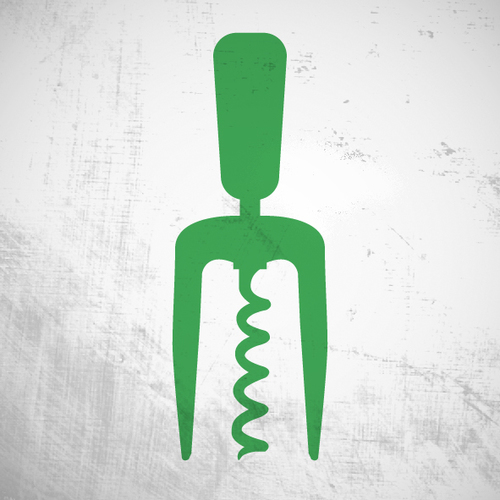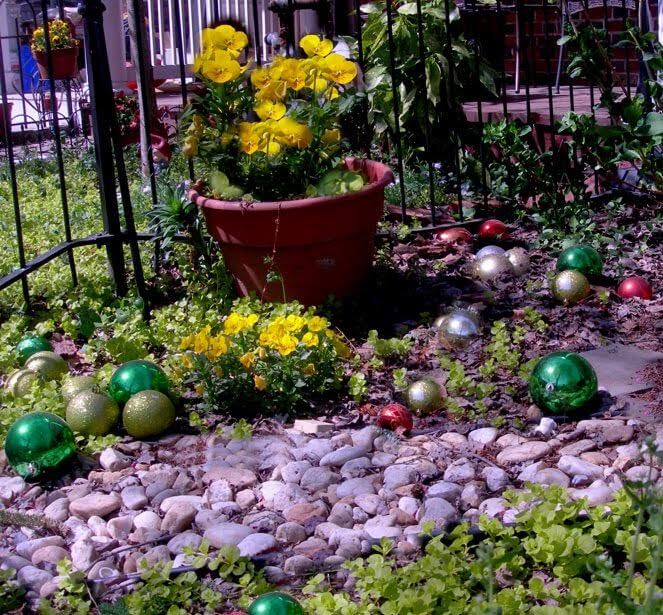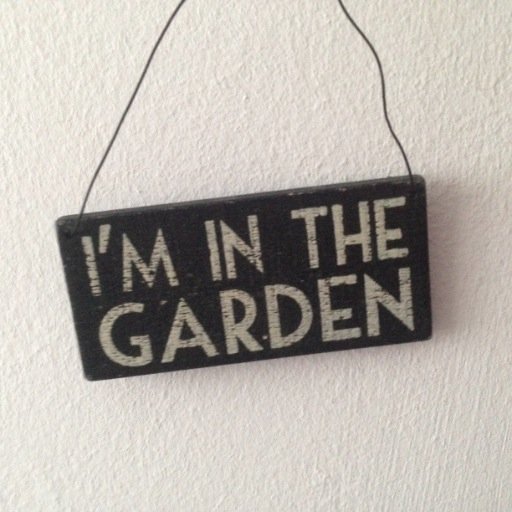Gardening experts and bloggers share their number one gardening tips to maintain a happy, healthy garden in the summer.

Gardening Experts Reveal Their #1 Summer Gardening Tips
Many gardeners experience a range of different issues whilst gardening in the summer time, which is why we decided to ask the experts for their top gardening tips to maintain a happy, healthy garden.
Here you'll find a range of great tips, tricks and personal techniques from several experienced gardeners.
Whether you primarily use your garden to seasonally plant flowers, grow your own vegetables or you simply like it to look presentable for the right occasion, expect to find valuable tips to enhance your gardening knowledge and avoid any disasters this summer!
Kay Hebbourn - This Week In The Garden

My top gardening tip is mulch.
The earth hates to be exposed. In nature, weeds appear very quickly on bare soil as the earth tries to re-cover itself as fast as it can.
For some reason, probably cosmetic, many people like to see vast patches of bare weed-free soil in their beds. It's a bit like people who choose drastic beauty treatments that carry health risks. Leaving bare soil results in soil erosion and mineral and water loss.
It also means lots of weeding. If you leave soil exposed, you will kill all of the beneficial mycorrhizal fungi that protect the plant roots. Mulching on the other hand, will improve soil quality, sometimes feed your plants, retain moisture and warmth and save you time weeding and watering. It also reduces the chance of your plants drying out and saves water.
You can mulch with lots of different things like: cardboard or carpet, fallen leaves, sheep's wool, chopped and dropped comfrey, straw, wood chip, stones or rhubarb leaves. You can even grow your own green manure and really boost the soil.
Keep picking vegetables.
By constantly harvesting beans, courgettes and other home grown veg you encourage the plants to produce even more. If all the picking activity results in a veg surplus then get preserving, pickling and home brewing with the ingredients.
My number one tip for summer is support early and support well.
Plants that need staking and support often suddenly burst into growth in late spring/early summer and making sure they are properly supported will help keep them looking their best all summer.
There are few things as heartbreaking to a gardener as a flopped over/wind flattened plant.
Nick Baker - New Garden Style
Quality rarther than quantity
Garden Art!
The last couple of years have seen an explosion of interest in Garden Art, and 2015 should be the year that you curate some pieces for your own garden.
An often overlooked aspect of garden design, some carefully selected Garden Art can be used to add drama, rejuvenate a tired garden or highlight your garden’s style. When searching for that perfect piece, ensure that it will compliment your garden and avoid any clashes.
For example, reflective pieces such as gazing balls and gloss-finished ornaments work great in colourful gardens, whereas rustic metal spheres are compatible with herbaceous borders. With a plethora of choices available, there will be something for all tastes and budgets.
My advice would be to go for quality rather than quantity, and seek out the pieces that will bring you joy for years to come.
Emma Cooper - Emma the Gardener
Keeping container plants watered and happy can be a big problem in the summer, when hot and breezy days dry them out rapidly.
A mulch (surface layer) of bark chips or pebbles over the soil can help prevent evaporation, and a saucer or tray underneath the pot catches drips for the plants to drink later.
Check every day whether you need to top up the water before heading off to work.
Prepare for drought before it happens.
Plan on how you're going to water your plants with drip irrigation before summer starts.
Stephanie Cavanaugh - Who Needs Flowers
Do not dwell on this picture, just glance by it.
Imagine wandering down a little side street and coming upon this pocket garden glittering its fool head off in the sunshine, thanks to strewn Christmas balls in what-have-you colors that might have dropped from the sky in a recent rain, all higgledy piggledy plop.
It's just happy. And, we might add, cheap. Consider a little later on in the summer when whatever you've bought and planted, that thing that was certain to bloom, instead fizzled in the heat while you were off sailing with Cucumber and Desmond and you can't plant a damn thing because of the heat wave (never mind that there's scarcely anything left at the garden center).
That's when you crawl up into the attic and dig around for the box helpfully marked Xmas Balls and dig about for the glitteriest specimens and cart them off to fill that bare patch. Happy. Cheap. Done. Drink time!
Catherine Hughes - Growing Family
Make your plant watering as effective as possible.
Frequent light watering encourages weeds and can also cause plants to make roots near the surface, which makes them vulnerable.
Instead, water the soil around plants really thoroughly, making little ponds around them, so the water can really soak in. Watering this way supports plants for much longer so you need to water less often - giving you more time to sit back and enjoy your garden.
Never have any bare soil
Mulch every bit of it with anything organic you have to hand: grass cuttings, bark or wood chippings, (try your local tree surgeon, they often need to get rid of some.)
Just pile them on, fresh, smother any weeds that are trying to get a grip. If they survive they will later be much easier to pull out of a mulch than bare soil.
Then take a glass of wine and a friend or lover, find a good place to sit and enjoy your garden. If it’s raining, I’m sorry to say you’ll just have to have your wine and your lover indoors instead.
Sue Cuthbert - Gardening in a Car Park
My number one gardening tip for the summer would be to stake and use plenty of plant supports to avoid your precious flowers flopping over as they put on amazing spurts of growth in the warm weather.
Narrow paths can quickly become overwhelmed and taller plants in the middle to the back of the border especially need staking early to avoid having to trample in amongst delicate stems and foliage later in the season!
Marianne Willburn - Small Town Gardener
Whatever you’re doing out there, do it early in the morning!
Summertime brings its challenges for our plants; but heat, humidity, insects and UV rays can take a real toll on us as gardeners and result in a severe sense of humor failure by 2pm on a Saturday afternoon.
That’s why my number one bit of advice every summer is the same: whatever you’re doing out there, do it early in the morning before 11 and later in the evening after 5.
There are plenty of interim indoor jobs to be done in tool sheds, greenhouses, and wicker chairs with a G&T in hand – exhausting yourself in the mid-day sun is for professionals who don’t have a choice, mad dogs and Noel Coward.
Alexandra Campbell - Middle-Sized Garden
Garden in your nightie (or pyjamas etc) is my best gardening tip for summer.
I wake up early in summer and the hours between 6.30am and 8.30am seem like a 'bonus' time. I make a cup of tea, and go outside to water the plants, if it hasn't rained overnight. As I go round with the watering can, I pull out any weeds I spot.
It's not the same as setting aside a couple of hours to weed a particular bed - but it does achieve a minimum level of control. The 'walk round' with a cup of tea also helps me compile a mental to-do list and appreciate which flowers have come out. By 8.30am, the dog will be asking for a walk, and emails will start coming in, so sometimes this early-morning slot is my only chance to garden.
Amy Renea - A Nest For All Seasons
My number one tip is always to consider the SOIL.
Hands down, soil is the most important component of prepping the garden for the growing season. Whether it is potting soil for a patio garden, a sandy soil for a succulent garden or compost-laden tilled rows for a giant vegetable garden, soil is the one area that gardeners should invest and cultivate before even thinking about plants!
In fact, I would say I spend double or triple the cost and effort securing and creating healthy soil compared to growing and acquiring actual PLANTS!
Our number one gardening tip during the summer is we recommend gardening during the early morning hours when the heat is not as strong as well as watering your plants more often, about every other day, especially potted plants.
We also suggest plants like hibiscus and Mandevilla that produce beautiful flowers all summer long and can withstand the heat.
When potting plants, line around the inside with cardboard before adding the compost, this will help keep water in for longer.
And an extra one for luck - vertical gardening - it's great to gain extra gardening space by making use of walls and fences - old pallets are great for creating living 'art' and Pinterest is awash with great ideas.
The Summer can be the hardest season of all for
gardening. After the rush of growth in late spring, keeping
up with all the jobs to do to keep the garden looking just
‘right’ can seem like an uphill battle. There’s the weeding,
the watering, the dead heading, the pruning, mowing,
edging, hedge trimming, tying-in and more and more
watering. The ground is often too hard to work and there’s
always something you forgot to stake, by which time it is too late.
Then you have to contend with the ants, bees and
horseflies, slugs, snails, rabbits, chickens and in some
gardens even deer.
Children playing gamesand diving into the borders after lost balls and dogs digging holes and the neighbours cats - well Iwon’t even go there...
The sweltering heat and relentless sun can burn you up and
slow you right down.
Then family and friends are outside enjoying being in the
garden. Eating drinking and admiring your handiwork and all you can see are the jobs that still need to be done.
My top tip for summer gardening is stop look and listen.
Sense the lingering perfumes on the air and the breeze
wafting through the leaves and petals. See the light shining
through all the different greens and coloured petals. Just
enjoy the remarkable detail and structure nature has created from the tallest tree to the tiniest weed.
This is the most important thing to do in a gardeners year,
as all too soon it is gone.
Lastly, don’t forget to give yourself a pat on the back and
maybe a large G&T as you see all your hard work coming to
fruition.
Shellie Wilson - Craft Gossip
Being a crafter, my tip would be to try something new. Use recycled items in the garden for fun and interesting designs.


















